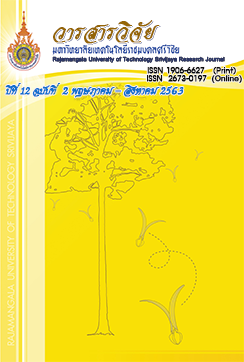Performance Enhancement of Air Conditioning with Refrigerant Temperature Reduction before Entering the Condenser Using Heat Exchanger Storage Tank
Keywords:
air-conditioning system, temperature reduction, heat exchanger storage tank, coefficient of performanceAbstract
The aim of this research was to examine performance enhancement of air conditioning with refrigerant temperature reduction before entering the condenser using heat exchanger storage tank. The experimental unit consisted of a vapor compression of 3.52 kW (12,000 BTU/hr) capacity with R-22 refrigerant and air cooled condenser. This study was divided into two experimental systems – the system without the heat exchanger storage tank and the system with the heat exchanger storage tank. Considering the system with the heat exchanger storage tank, the results showed that the refrigerant temperature at the compressor outlet passing through the heat exchanger storage tank decreased at 11.03 oC while the refrigerant temperature at the evaporator outlet passing through the heat exchanger storage tank increased to 5.63 oC. Nevertheless, comparable results between the system without the heat exchanger storage tank and the system with the heat exchanger storage tank indicated that the heat transfer rate of condenser increased to 12.11 %, reduced power consumption by up to 3.10 %, and the highest coefficient of performance with an increase of 15.38 %.
References
Hajidavalloo, E. and Eghtedari, H. 2010. Performance improvement of air-cooled refrigeration system by using evaporatively cooled air condenser. International Journal of Refrigeration 33: 982-988.
Hsiao, M.J., Heng, C.H.C., Huang, M.C. and Chen, S.L. 2009. Performance enhancement of a subcooled cold storage air conditioning system. Energy Conversion and Management 50(12): 2992-2998.
Juengjaroennirachon, S., Namprakai, P., Pratinthong, N., Suparos, T. and Roonprasang, N. 2012. A study of the amount of condensed water coming out of evaporator under different air temperature conditions affecting energy savings in air-conditioning system, pp. 1081-1087. In The International conference 13th of the Thai Society of Agricultural Engineering 2012. Chiangmai, Thailand.
Juengjaroennirachon, S., Pratinthong, N., Namprakai, P. and Suparos, T. 2017. Performance enhancement of air conditioning using thermosyphon system’s energy storage unit for cooling refrigerant before entering the condenser. Journal of Mechanical science and Technology 31(1): 393-400.
Nasution, D.M., Idris, M., Pambudi, N.A. and Weriono. 2019. Room air conditioning performance using liquid-suction heat exchanger retrofitted with R290. Case Studies in Thermal Engineering 13: 1-7.
Stoecker, W.F. and Jones, J.W. 1982. Refrigeration & Air Conditioning, 2nd International edition. McGraw-Hill, Singapore.
Yamtraipat, N., JKhedari, J., Hirunlabh, J. and Kunchornrat, J. 2006. Assessment of Thailand indoor set-point impact on energy consumption and environment. Energy Policy 34: 765-770.
Downloads
Published
How to Cite
Issue
Section
License
The content and information in the article published in Journal of Rajamangala University of Technology Srivijaya It is the opinion and responsibility of the author of the article. The editorial journals do not need to agree. Or share any responsibility.







